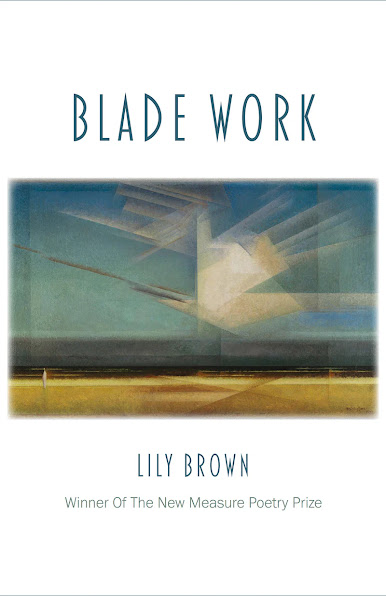I heard the voice of
reason
swerve boneward as it
mouthed
the high hills of Art.
I know both sides:
the violence of artifact
and the living tree,
airy branches full of
weeds.
Once a sitting thing in a
thing
that stuck me back, I walk
straight out in heavy
rain,
trying not to aim,
his lungs gum-thick,
each word towed out with
a chain
pulled simultaneously
back.
I make another motion,
send a jagged gift. (“Venus
Transit”)
I’ve been an admirer of the work of American poet Lily Brown, a poet and writing teacher currently based in Maine [see her 12 or 20 questions here] ever since discovering her work through the chapbook Being One (Brave Men, 2011) [see my review of such here]. That particular title was soon followed by her full-length debut, Rust or Go Missing (Cleveland OH: Cleveland State University Poetry Center, 2011) [see my review of such here] as well as a further handful of chapbooks, including The Haptic Cold (Brooklyn NY: Ugly Duckling Presse, 2013) [see my review of such here]. Her latest collection, her second full-length, is BLADE WORK (Anderson SC: Parlor Press, 2025), produced as Winner of the New Measure Poetry Prize, as selected by Carl Phillips. I’m amazed at the carved sharpness and meditative distances travelled across her purposeful, tactful lyrics. Through Brown, every word, line and step is deliberately and carefully set, but with such a cadence of ease, composing poems of disruption, description and a hint of surrealism, set in pure stone. “The horse gallops / fog under its chin,” she writes, to open the poem “After Susan Rothenberg’s Untitled Drawing, No. 41, 1977,” “behind a hind leg, / haze in parts erased. / The smudge in the body’s / portioned air. Darwin / threw lizards / by the tail / into the ocean / to find out if they swim.” There’s such a clarity, a density, to her poems, one that allows for stunning moments, the narratives of her poems accumulating with such force into perfect phrases, perfect landings. As the second half of her short poem “Transparency” offers: “All day I splinter leaves / with my feet, conduct them // in, singed flags. / I think I see you in the back window, // waving there, your show moving / west then east. // Torso turns to see // how great a distance / I earned to make.” The underplayed power of her poems are enormous, landing her endings with incredible grace, the click of a latch to know that door is now closed. “Give some back to the mapland.” She writes, to open “The Complete Poems,” a piece composed “after Elizabeth Bishop.” “Material qualities, stammering / repetition. More interested / in atmosphere, leaf and cloud, / than clock-like architecture’s alarms.”



No comments:
Post a Comment